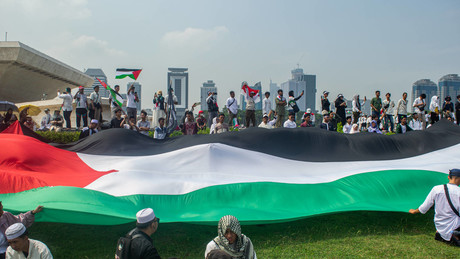
ICJ decides on measures against Israel: A ceasefire would be the necessary consequence
The International Court of Justice has made its decision on South Africa's request for interim measures to prevent genocide in Gaza.
The court in The Hague declares that provisional measures against Israeli actions are appropriate.

Israel must take all measures to prevent any actions that violate the Convention. Israel must immediately ensure that its military no longer commits such acts. Basic supplies must be guaranteed. The destruction of possible evidence of violations must be prevented.
Israel must report on the measures taken within one month.
Israel must punish calls for genocide.
Israel must take immediate and effective measures to normalize living conditions.
The acts that must no longer take place are those identified in Article II of the Genocide Convention:
- Killing members of the group
- Causing serious physical or psychological harm to members of the group
- intentional imposition on the group of living conditions likely to bring about its physical destruction, in whole or in part
- Imposition of measures aimed at preventing births within the group
While South Africa explicitly called for an immediate ceasefire in its lawsuit, the court skirted this term in its decision. But a ceasefire is undoubtedly the prerequisite for complying with these requirements.
Before the announcement, all requirements for the jurisdiction of the court and the basis for the imposition of provisional measures were set out:
Is there a dispute between South Africa and Israel regarding the Genocide Convention? Yes, proven by public statements from both sides and diplomatic exchanges.
The court does not currently have to determine whether genocide has occurred, but only confirms that at least some of the actions South Africa accuses Israel of are covered by the Genocide Convention. The court is responsible for this.
Any country that has signed the convention can sue another country that has signed it. The South African lawsuit is justified.
Is there a basis for provisional measures? Yes.
The convention assumes that the goal is to destroy significant parts of the attacked group.
Israel's military actions have killed 25,000 Palestinians and left 1.7 million internally displaced. The reports from the UN specialized agencies that are cited document the humanitarian catastrophe. The court noted the numerous statements made by Israeli officials that dehumanize the affected residents. Gallant and Herzog are quoted, among others. From the court's perspective, South Africa's account is plausible, and the measures demanded are at least partly a response to it.
The urgency and lasting harm that could occur to safeguard the rights of the affected group are confirmed. Leading UN representatives have repeatedly pointed out that permanent damage will be caused.
The civilian population in Gaza is extremely vulnerable. The military operation will continue and will last for a long time. The population has no access to water, food and medicine. The catastrophic humanitarian situation would continue to deteriorate until a final verdict was reached.
The steps taken by the Israeli Attorney General's Office to punish calls for genocide are not sufficient.
The conditions for provisional measures exist.
The section on interim measures begins at point 78 of the instruction issued by the International Court of Justice :
"78. The Court considers that, in view of the situation described above, Israel must, in accordance with its obligations under the Genocide Convention, take all measures within its power to prevent the exercise of any acts in relation to the Palestinians in Gaza covered by Article II of this Convention, in particular:
(a) killing members of the group;
(b) cause serious physical or psychological harm to members of the group;
(c) impose living conditions on the group that are intended to physically destroy it, in whole or in part, and
(d) to impose measures aimed at preventing births within the group.
The Court recalls that these acts fall within the scope of Article II if they are carried out with the intention of destroying, in whole or in part, a group as such. The Court further considers that Israel must, with immediate effect, ensure that its armed forces do not commit any of the acts described above.79. The Court also considers that Israel must take all measures within its power to prevent and punish the direct and public call to commit genocide against the members of the Palestinian group in the Gaza Strip.
80. The Court further considers that Israel must take immediate and effective measures to ensure the provision of urgently needed basic services and humanitarian assistance to counter the hostile living conditions in which Palestinians find themselves in Gaza.
81. Israel must also take effective measures to prevent the destruction and ensure the preservation of evidence relating to allegations of acts within the scope of Articles II and Article III of the Genocide Convention committed against members of the Palestinian group in Gaza. stripes.
82. With regard to the measure requested by South Africa that Israel report to the Court on all measures taken as a result of this order, the Court recalls that, in accordance with Article 78 of the Rules of the Court, it has the right to require the parties to: In connection with any provisional measures it has decided to request information. With regard to the specific provisional measures which it has decided to order, the Court considers that Israel must submit to it a report on all measures taken to implement this order within one month from the date of this order. The report so delivered should then be sent to South Africa, which will then be given the opportunity to submit its comments to the court.
83. The Court recalls that its order of provisional measures has binding effect under Article 41 of the Statute and therefore creates an obligation under international law on each party to which the provisional measures are addressed."
More on the subject - South Africa's move against the genocide in Gaza
By blocking RT, the EU aims to silence a critical, non-pro-Western source of information. And not just with regard to the Ukraine war. Access to our website has been made more difficult and several social media platforms have blocked our accounts. It is now up to all of us whether journalism can continue to be carried out in Germany and the EU beyond the mainstream narratives. If you like our articles, please share them wherever you are active. This is possible because the EU has not banned our work or the reading and sharing of our articles. Note: However, with the amendment to the "Audiovisual Media Services Act" on April 13th, Austria introduced a change in this regard that may also affect private individuals. That's why we ask you not to share our posts on social media in Austria until the matter is clarified.


